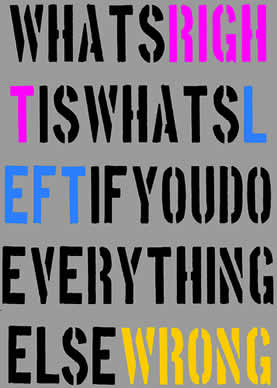UNIT 8: IDEOLOGY & CITIZENSHIP
| Site: | MoodleHUB.ca 🍁 |
| Course: | Social 30-1 RVS |
| Book: | UNIT 8: IDEOLOGY & CITIZENSHIP |
| Printed by: | Guest user |
| Date: | Thursday, 30 October 2025, 10:49 PM |
Table of contents
- 1. OVERVIEW
- 2. CONCEPTS AND TERMS
- 3. Citizenship and Ideology
- 4. Canadian Citizenship
- 5. QUIZ 8.1: CITIZENSHIP
- 6. Aboriginal Views of Citizenship
- 7. Values Guide Citizenship
- 8. How Ideology Shapes Citizenship
- 9. Evaluating Citizenship
- 10. Rights and Roles of Citizenship
- 11. Responsibilites of Citizenship
- 12. Citizenship in Times of Crisis
- 13. Rights of Citizenship
- 14. The Power of Civic Action
- 15. Strategies for Active Citizenship
- 16. UNIT 8 SUMMARY
- 17. SUMMATIVE EXAM
1. OVERVIEW
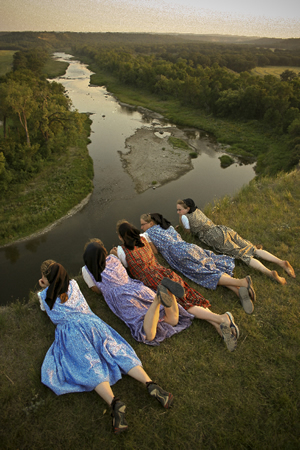
You also have your own identity, an ever-changing product of your genetics and the outside factors that influence you throughout your life including the influences of the many communities to which you belong.
Throughout your social studies education, you have learned about the key concepts of identity and citizenship. You have learned that you have an individual identity and also an identity as a member of a collective. People do not live in isolation. They live in communities. As part of any community, people have not only an identity but also certain rights and responsibilities that accompany belonging to that community. As these Hutterite girls have responsibilities to their community, so do we all have obligations to our own communities, our nation, and our planet.
Citizenship happens where individual identity meets collective responsibility.
Specifically, what do we mean when we talk about citizenship? How are your actions as a citizen shaped by your ideology?
Dictionaries usually provide two definitions for citizenship:
- the legal status of being a citizen (that is, a legally recognized subject of a state)
- the social conduct or behaviour that comes with being a member of society including the duties and responsibilities that entails
Your ideas about what being a citizen means and what actions accompany belonging to your community, nation, and planet are determined by your beliefs about the world-your ideology. Your beliefs about the nature of human beings, how you see the past, how you interpret the present, and what you imagine for the future all shape your actions as a citizen. People with a strong belief in individualism may act one way while those with a strong belief in the principles of collectivism may act another.
Your actions are based not only on who you are but also on what you want the world to look like.
Isaiah Berlin
This unit has two sections:
- Worldviews and Citizenship
- Taking Action
2. CONCEPTS AND TERMS
Unit Question: What does it mean to be a citizen in a liberal democracy?
Issue Question: To what extent should be actions as a citizen be shaped by an ideology?
In this unit, you will explore the following big ideas based on questions arising from the issue question:
- How does my worldview influence my ideology?
- What does it mean to be a citizen in a liberal democracy?
- What responsibilities do I accept as part of my Canadian or other citizenship?
This is a list of new terms you will encounter in this unit.
citizen advocacy
civility
civil disobedience
civil rights movement
conscientious objector
dissent
humanitarian crisis
law and order
McCarthyism
pacifism
political participation
pro-democracy movement
3. Citizenship and Ideology
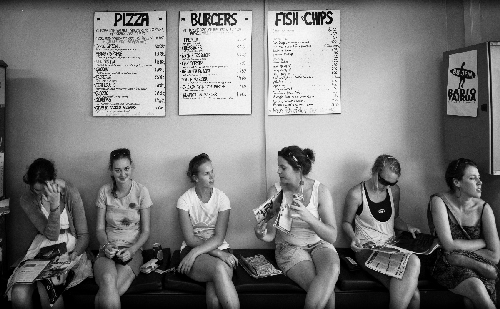
Juanita is an honours student who is secretary of her grad committee and vice-president of her student council; she plays first trumpet in the school band and helps with the junior high homework club after school.
Lillia lives on her own, has a baby, and works at Costco after school to pay her bills.
Benlita is a recent immigrant to Canada who attends an art program at the Mennonite Centre for New Canadians where she practises her English skills. She uses her new English skills to help her parents adapt to their new nation.
Which of these students would you say are "model citizens"? Does one of them seem more like a leader to you than the others? Each one belongs to a community and has accepted various roles and responsibilities that come with belonging. Although Juanita may seem to have taken on more leadership roles, all these students are leaders in their own way. Each one has accepted responsibility for belonging.
If you were to ask each of the six girls in the photo to tell you what "citizenship" means, you would get six different answers. Our understandings of what it means to be a citizen of a community, nation, or the planet depend on the experiences, beliefs, and values and that shape our collective identity. Just as our worldviews shape our identity and ideology, they also shape our ideas about how to act as citizens both in times of peace and in times of crisis. The students in the Grade 12 class-Juanita, Matthew, Lillia, Benlita, and Awasis-are all Canadian citizens. They each have an important role as citizens in their communities and their nation. Each has a different worldview and a different idea of what citizenship and leadership means.
Read the quotations below. Do you agree with any of the following definitions of citizenship?
- To me, it means having an national identity, not just being patriotic, but being able to identify with my country of origin with pride.
- Reciprocal belonging ... the city, province, country, world belongs to me and I belong to it.
- Reciprocal responsibility ... I am responsible for the city, province, country, world and "it" is responsible for me.
- Citizenship is formally adopting and/or accepting the laws of the country in which you permanently reside, and in return, you are afforded all the rights and freedoms of the country in which you permanently reside.
- Citizenship means being a part of something really big-responsibility, respect, empathy, and caring on a grand scale.
How does my worldview influence my ideology?
4. Canadian Citizenship
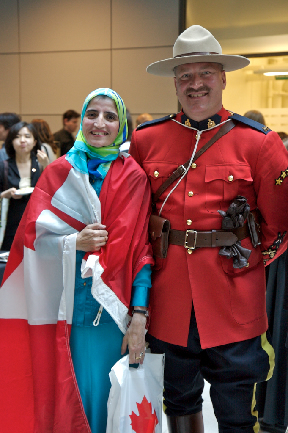
On Thursday May 15, 2008, 60 new Canadians from 26 countries were welcomed to their new country at a Citizenship Court held in the MaRS Auditorium in Toronto. The special extended ceremony was a concept of the Institute for Canadian Citizenship to assist
New Canadians to bridge the gap from immigrant to fully engaged citizen. As part of the citizenship ceremony, each new Canadian affirmed the following oath:
The Oath of Citizenship
That I will be faithful
And bear true allegiance
To Her Majesty Queen Elizabeth the Second
Queen of Canada
Her Heirs and Successors
And that I will faithfully observe
The laws of Canada
And fulfill my duties as a Canadian citizen.
What do you think about this oath?
If you were writing an oath of Canadian citizenship, what would it include? Would you include any of the following?
- the responsibility to vote
- the responsibility to pay taxes
- the responsibility to volunteer in your community
- the right to freedom of expression
- the right to freedom from excessive poverty
- the right to protest government actions you believe are unjust
You can find out more about how a person applies for citizenship by looking at the Government of Canada guide "Discover Canada: The Rights and Responsibilities of Citizenship".
Another exciting way to rediscover your own citizenship is to attend a citizenship ceremony. You will find that many new Canadians are deeply moved by their sense of belonging to Canada. As Canadians, many new immigrants are able to experience rights
and freedoms that were unavailable to them in other countries, including the right to political participation. Things that many Canadians take for granted are treasured by newcomers.
- How much of your identity is wrapped up in your identity as a Canadian?
- Do you think that some aspects of Canadian citizenship are unique in comparison to citizenship in another country?
- Is it right that we require immigrants to have some basic knowledge of Canada before they become citizens?
- Should people born as Canadians learn the same things about Canada? Why or why not?
5. QUIZ 8.1: CITIZENSHIP
1. Go to the unit tab to find the quiz.
2. Do the quiz.
3. Review some course vocabulary.
6. Aboriginal Views of Citizenship
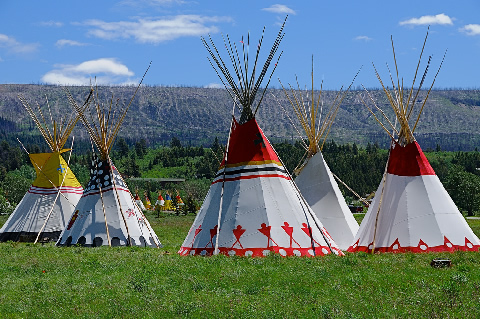
© Courtesy Phil Kunz
Native citizenship is outlined under the Indian Act. However, members of First Nations want the right to determine who is entitled to citizenship without the involvement of the federal government.
According to Article 33 of the United Nations Declaration on the Rights of Indigenous Peoples, "Indigenous peoples have the right to determine their own identity or membership in accordance with their customs and traditions." However, in Canada, Indigenous people do not make that determination. Citizenship is defined through federal legislation.
Consider some Aboriginal views on citizenship:
Bob Goulais, member of the Nbisiing Anishinaabeg Nation
AFN National Chief Shawn A-in-chut Atleo
The Assembly of First Nations is the national organization representing First Nations citizens in Canada. The AFN represents all citizens regardless of age, gender or place of residence.
|
|
|
- Is it possible to have citizenship in a First Nation within Canada?
- What challenges might such dual citizenship cause?
7. Values Guide Citizenship
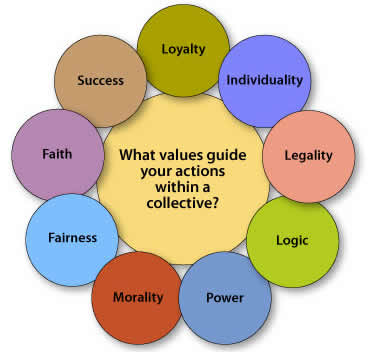
from Discover Canada:The Rights and Responsibilities of Citizenship; Citizenship and Immigration Canada
Another way to look at how your ideology and your citizenship are related is shown in this graphic:

- How does worldview influence people's actions as citizens?
- What do you think are the characteristics of an ideal citizen?
8. How Ideology Shapes Citizenship
- political, social, and economic
- individualist and collectivist
- right and left
- capitalist and communist
- fascist, socialist, anarchist, conservative, illiberal, classical liberal, and modern liberal
As the image indicates, ideologies can be confusing! However, your ideas about what the role of a citizen should be depends on your ideology. Review the principles of liberalism and collectivism again.
Think about which of the principles you value. How might your belief in these principles translate into actions as a citizen?
| Collectivism | Individualism |
|
|
Liberalism is based on the principles of self-interest, individual rights, and economic freedom. However, although nations are made of individual citizens, when they work together in a democracy, they form a collective. By voting, they decide on the world they want and express this through the will of the majority. Modern liberal democracies have evolved to place value not only on self-interest but also on collective interest.
Individualism and Collectivism
Think about the following headlines and possible solutions:| Problem | Solution One | Solution Two |
| "Recycle More, Waste Less, UBC Students Urge" (Vancouver Sun) | City council provides curbside recycling services funded through municipal taxation. | Individual citizens collect their own recycling and drive it to the town recycling centre at their own expense. |
| Childhood Obesity a 'clear and present danger' (Connecticut Mirror) | Schools provide fitness and/or nutrition activities to every child | Parents pay for or find volunteers to provide fitness activities for their children. |
| Debate Raging Over Alberta's Workplace Safety Record (Calgary Herald) | Provinces set up regulations to ensure worksite safety is practised. | Companies monitor themselves. |
| Healthcare Gets a Failing Grade (BusinessWeek) | The federal government establishes universal health care. | Each person pays for his or her own healthcare. |
|
Solution One |
Disadvantages |
|
City council provides curbside recycling services funded through municipal taxation. |
|
|
Schools provide fitness and/or nutrition activities to every child |
|
|
Provinces set up regulations to ensure worksite safety is practised. |
|
|
The federal government establishes universal health care. |
|
|
Solution Two |
Disadvantages |
|
Individual citizens collect their own recycling and drive it to the town recycling centre at their own expense |
|
|
Parents pay for or find volunteers to run fitness activities for their children and monitor food intake. |
|
|
Companies monitor themselves. |
|
|
Each person pays for his or her own healthcare. |
|
Jus Soli Citizenship
Challenges to Jus Soli Citizenship
Naturalization Citizenship
Dual Citizenship Pros and Cons
Which Countries Don't Allow Dual Citizenship
By implementing some of the principles of collectivism including collective interest, public ownership of some property, and if not economic equality at least freedom from extreme poverty, citizens use participatory democracy to construct the system they think works best for the majority. In Canada's liberal democracy, some of these goals are protected by the Charter of Rights and Freedoms. Others are protected through law. Still others are supported by government programs and policies.
- How does your ideology influence your actions?
- Do you think your ideology makes you a responsible citizen? Explain.
9. Evaluating Citizenship

The statement on the flag is quoted from Mohandas Gandhi, the political and spiritual leader of India during its independence movement. He advocated non-violent civil disobedience to resist tyranny, which inspired the civil rights movements for civil rights around the world. The full text of the quotation is "You must be the change you wish to see in the world."
In the previous section, you considered various perspectives on citizenship. What citizenship means to you depends on your worldview and your ideology. However, the general understanding of citizenship is that it includes both civil rights and human rights and the civic responsibilities that accompany belonging to a society. Citizenship involves both individual and collective rights and responsibilities. It is personal, but it is also something that we share.
Citizenship in a liberal democracy has political, social, and economic implications. Politically, it involves in the democratic process through voting and obeying the laws of the land. It can also mean being informed about issues, supporting political parties through donations and actions, speaking out when you agree or disagree with government policies, and running for office. Socially, it means doing your part to make your community a better place. Economically, it means paying your taxes-and can also mean using the government services that are offered to you as a Canadian and spending your money responsibly to support corporations you believe in.
We cannot all be Mandela or Gandhi, but we each can take action as citizens in our own way.
Mark Sanford
In this section, you will consider the roles, rights, and responsibilities of citizens in a liberal democracy. You will consider responses to humanitarian crises and the role of dissent and protest. You will also evaluate the most effective means of taking action to affect change in society .
10. Rights and Roles of Citizenship

- legal rights
- mobility rights
- equality rights
- Aboriginal rights
- freedom of thought
- freedom of speech
- freedom of religion
- freedom of peaceful assembly
Most nations guarantee similar rights and freedoms to their citizens by law as part of their constitutions.
Individual citizens have various ideas about their roles and responsibilities depending on their worldview and the ideologies they follow. Generally, most people in liberal democracies believe that citizens should contribute positively to their communities, nation, and globe through the following responsibilities:
- political participation
- respect for law and order
- advocating for the rights of all citizens
- behaving in an acceptable and polite manner
- speaking out against injustice
|
11. Responsibilites of Citizenship

For democracy to work, people must participate in elections. Otherwise, their voice is not heard, and the key basis on authority in democratic societies has ceased to exist.
Being informed about issues, contributing to political campaigns, and running for office are important aspects of participatory democracy. Another important way of acting responsibly is through making your voice heard. There are many other ways to participate in the political life of one's community. This type of involvement in one's community is known as citizen advocacy, which includes the following:
- Writing letters to your local newspaper editor, MLA , MP, or the prime minister is a way for citizens to let their leaders know their views. Through this input the government can learn what people want and how voters may react to legislation.
- Petitions involve writing one letter with many people signing it. A petition can be a very powerful way of showing the government what citizens want.
- Protests and demonstrations draw attention to concerns. Although peaceful protests and demonstrations are acceptable ways of influencing decision-making, that they do not become illegal actions is important.
Although we know that voting is essential to the health of a democracy, voter apathy is a problem in many nations around the world.
The world map shown is distorted to reflect voter turnout around the world. Note that voter turnout in the liberal democracies on the map ranges from a low of 47% in the United States to a high of 95% in Australia, where voting is required by law.

|
- "Broader Understandings of Citizenship", pages 450 to 452
- pages 465 to 466, beginning with the sentence "Another area in which..."
12. Citizenship in Times of Crisis
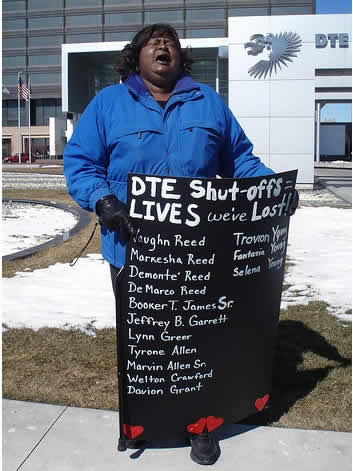
The woman on the left is protesting against her local utility company that has shut off the power to people who have not paid their bills, resulting in the deaths of several people in the area. To shame the company into providing for its customers, she is publicizing the names of those who died.
Many kinds of crises occur in our world today. Some involve local disasters, both natural and man-made. Others involve environmental catastrophes that damage the ecosystem, including the habitats of plants, animals, and human beings. The most serious global issues tend to be unpredictable massive natural disasters that cannot be controlled by the actions of people, including floods, famines, pandemics, tornados, hurricanes, droughts, blizzards, volcanic eruptions, earthquakes, and landslides.
Some examples include the earthquake that struck Haiti in 2010 killing 230,000 people. In 2008, an earthquake in Sichuan province of China killed more than 70,000 people. The tsunami that struck Indonesia in 2004 left more than 230,000 death.
These global disasters call on people all over the globe to demonstrate their "global citizenship", which is their compassion for people who are in need outside their own nations.
Responding to these disasters can take many forms. Many people come forward with donations of money or supplies. Others volunteer their time to raise funds, some make the commitment of their time and energy to go to the place of crisis and volunteer to build houses, deliver medical aid, or help with clean up.
|
|
|
13. Rights of Citizenship
Consider the t-shirt in the photo. The people in this photo are members of the "Tea Party"-a right wing movement that protests, among other things, the leadership of their president Democrat Barack Obama. How is this protest related to ideology? Is it a form of citizenship?
When we think about extremism, we often think of religious fundamentalism, fascism, and communism. Is it possible to be extremely committed to liberal democracy to the point of fanaticism? You may have noticed a political perspective on some U.S. news channels that is polarized to the far right. On these channels, news anchors, reporters, and commentators frequently criticize politicians and government policies in ideological terms that may differ wildly from your own understanding of what those words mean. To judge the relevancy and accuracy of these statements, compare them to your understanding of the ideological spectrum learned in the course.
Example: McCarthyism during the Cold War
From the late 1940s to the late 1950s McCarthy accused thousands of US citizens of of being communist sympathizers. These people-often writers, artists, entertainment industry celebrities, teachers, or union organizers-were investigated aggressively by government committees such as the House Un-American Activities Committee. Many lost their jobs and had their careers destroyed; others were imprisoned. It caused fear and division within the United States and limited freedom of expression because people feared they could be jailed or fired for speaking their minds. These actions were illiberal, as they violated the rights of many Americans in order to eliminate any perceived communist threat.
|
The term McCarthyism has come to refer to making reckless accusations of disloyalty, subversion, or treason without regard for evidence as well as making personal attacks on the character or patriotism of those with whom the accuser does not agree. McCarthyism was a product of the anti-communist fears of the era, based on unsubstantiated rumours and intense adherence to a particular ideology.
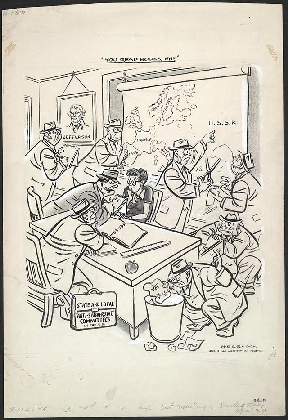
From Herblock's History:Political Cartoons from the Crash to the Millenium. Library of Congress LC-USZ62-127202 ©Courtesy Herb Block Foundation
- Does persecution of people who believe in other ideologies have any place in today's liberal society? Explain.
- If freedom of speech is a key element of citizenship, should people be free to promote hatred?
14. The Power of Civic Action
There are many reasons people do not agree with government actions. In your study of the historical evolution of liberalism, you learned that, as people obtained more economic freedom, they demanded more political and social rights, which led to the fundamental rights and freedoms guaranteed by democratic systems today. What happens in political systems that have traditionally not been democratic? How has the pro-democracy movement led to political change in contemporary society?
After the collapse of communism in the Soviet Union, the former nations of the Soviet Union moved towards both capitalism and democracy. However, political change was slow. Many nations retained their communist leaders because there was no effective system in place to remove them. Many nations experienced voter intimidation and election fraud. One example was the Ukraine, where a massive protest movement led to change.
Besides voting, citizens in democracy can openly protest, peacefully gather, and openly express their beliefs in public. Unlike non-democratic nations, citizens can publicly dissent or disagree with their government.
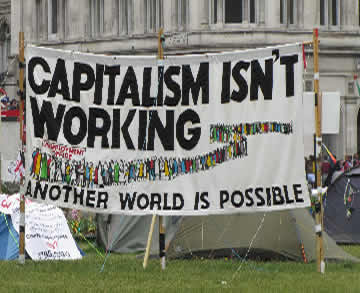
Anti globalization protesters take to the streets to get their message across, especially at global conferences such as those held by the World Trade Organization and the G-8 (an international forum for eight industrialized nations) or G-20 (Group of Twenty Finance Ministers and Central Bank Governors).
Their actions usually range from peaceful protests to large-scale demonstrations. Sometimes this shuts down cities and lead to looting, vandalism, violence, and property damage.
Citizenship in a liberal democracy means obeying the laws created by our democratically elected governments. But it also means freedom of thought and freedom of conscience. What happens when the views of citizens conflict with those of government?
|
|
Civil Disobedience
Sometimes differences in ideology results in a citizen peacefully breaking of the law. This is called civil disobedience. You may see it when an environmentalist illegally chains themselves to a tree to prevent deforestation, or in other cases, they simply refuse to obey a law that is 'unjust' and are willing to accept the consequences of breaking that law."The War against the Vietnam War", pages 485 to 489
- What happens when pacifists are expected to protect their nation by entering into military service?
- Or what about participation in wars that citizens may feel are unjust, unwinnable, or pointless? How should citizens act in those situations?
During the Vietnam War, American pacifists disobeyed the law in a number of ways. Some young men burned their draft (conscription notice) cards to enlist in the army, others refused to join and deserted by fleeing to Canada.
What comparison is being made between dissent and the practices of a dictator like Saddam Hussein?
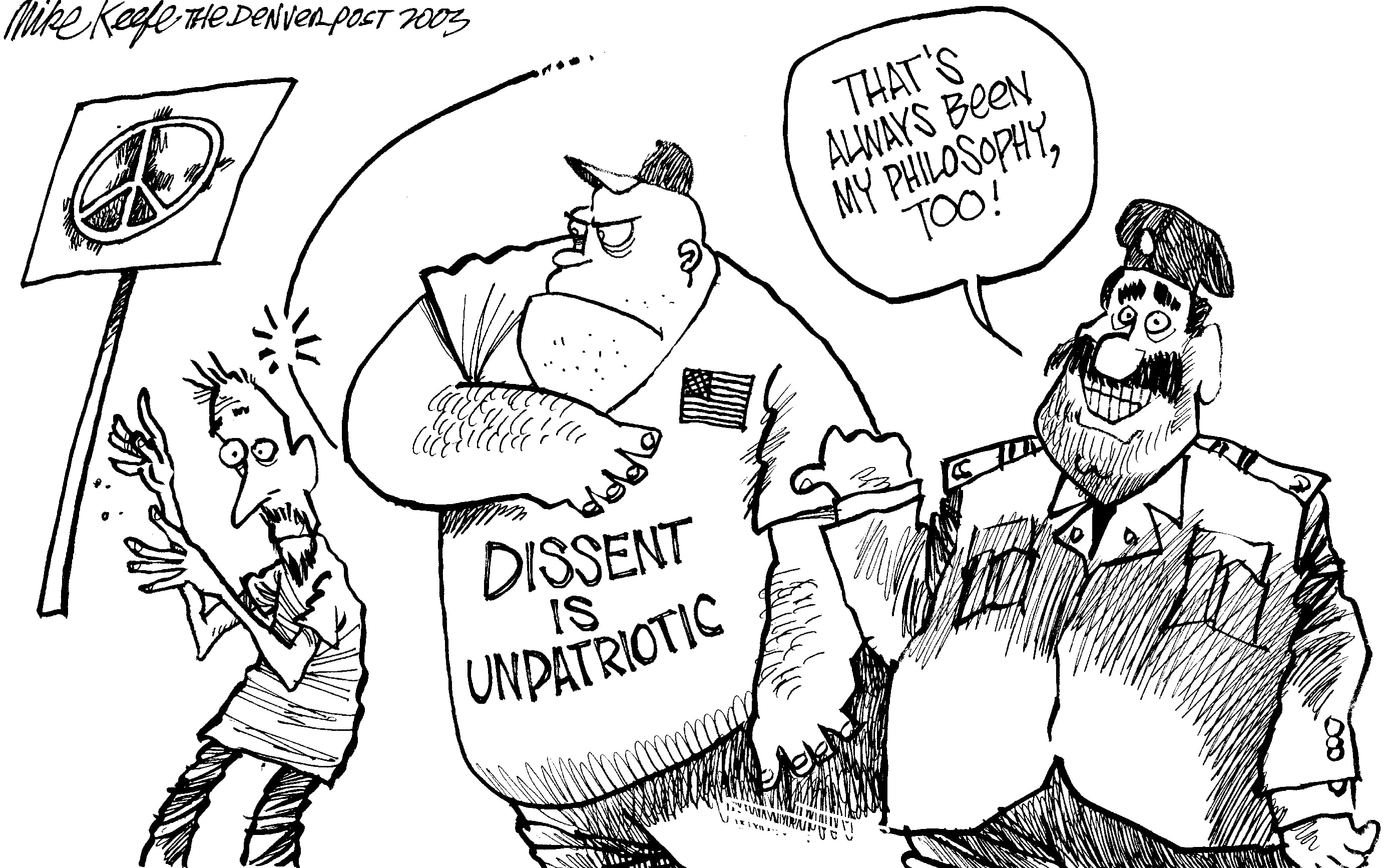
- What strategies of dissent are used most commonly?
- What strategies of dissent are most effective?
- What connections do you see between liberalism and dissent?
15. Strategies for Active Citizenship

Wasyl did a web search for the movie and was taken to a link that suggested several actions. He and his friends could sign a petition, learn more about the issue, donate money to the film makers, write letters to officials, or join a group on their favourite social networking site.
They discussed the suggestions.
- What would do the most good?
- What would be the best way to lead to change?
- How could they ever know if their actions would have any effect?
Without realizing, Wasyl had already taken two key steps on the road to effecting change:
- believing that change was possible, and
- being prepared to take a leadership position to effect change.
Not only was he prepared to take action as an individual, he was also ready to stir his community to take collective action.
- Believing in change
- Acting on your beliefs
- Consequences of inaction
- How to raise awareness
- How to organize people
- What are the first steps needed before one can take action?
- What activities are suggested that could lead to change?
- Which of the suggested activities do you think are most effective?
16. UNIT 8 SUMMARY
Unit Eight has explored:
- how one's worldview and one's ideology shapes individual and collective citizenship
- the rights, roles, and responsibilities of citizens in a democratic society through a focus on the issue question, To what extent should my actions as a citizen by shaped by an ideology?
This unit completes your high school social studies education. Through your study of identity and citizenship, you should have formed a deeper understanding who you are, including not only the factors that have shaped your character, but also an understanding of where you belong in your world and the responsibilities that belonging entails.
| Worldviews and Ideology | Roles, Rights, and Responsibilities of Citizenship |
|
|
When you have finished reviewing your notes, complete the Unit Review for Unit Five. When you have completed the multiple choice review, take a look at the feedback provided. If you so choose, after waiting 30 minutes, you may complete the quiz again, keeping in mind that the questions and the order of the possible answers are randomly generated. The second version of the review will be different from the first.
You have now completed all the course work for Social Studies 30-1. It is time to prepare for Final Exam, the second supervised exam in this course. The Final Exam includes all concepts you have studied in Units Five through Eight on the multiple choice. It does not cover the first four units of the course. The position paper and the source based response are cumulative in that you can use any relevant information about liberalism and other ideologies. You get 3 hours to write this exam.
...and remember the Diploma Examination
17. SUMMATIVE EXAM
Please review all of your notes, readings, and vocabulary you have learned up until this point. Once you feel you are ready, you can attempt your last summative exam of the course. You will need permission to write this exam and you will need to be supervised at your school or campus.
Please let me know if you have any questions!
